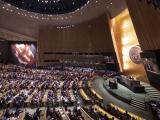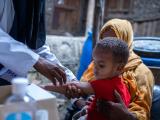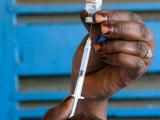Jan 25, 2010 (CIDRAP News) – Just days before a Council of Europe hearing to discuss claims that pharmaceutical companies influenced the World Health Organization's (WHO's) pandemic response, the global body said charges by some European officials that the pandemic is "fake" are "wrong and irresponsible."
In a Jan 22 statement sent to journalists today, the WHO said cooperation from a range of partners, including the private sector, is needed to conduct essential public health actions and it has safeguards in place to guard against conflicts of interest.
In December a Council of Europe group, headed by Dr Wolfgang Wodarg, a German physician and politician who chairs council's health committee, introduced a resolution asking the council to investigate charges that pharmaceutical companies have pressured countries to waste resources on inefficient immunization campaigns using vaccines that they say haven't been thoroughly tested.
The Council of Europe, an organization of 47 nations, will conduct a public hearing titled, "The handling of the H1N1 pandemic: more transparency needed?" tomorrow on the second day of its parliamentary assembly in Strasbourg, France, according to information posted on the group's Web site.
The council will conduct the hearing alongside its plenary session. The hearing and a press conference to follow will be streamed live on the council's Web site.
According to the council's agenda, presentations will be made by Wodarg; Dr Keiji Fukuda, special advisor on pandemic influenza to the WHO director-general, Dr Luc Hessel from the European Vaccine Manufacturers; and Dr Ulrich Keil, who directs the WHO's collaborating center in Munster, Germany.
The Council of Europe's move to air the Wodarg group's criticism of the WHO and pharmaceutical companies came as several European nations started scaling back their vaccine orders. Weak demand for the vaccine in the face of declining flu activity and the need for just one dose have left many countries with surpluses
The Council of Europe's Social Affairs Committee had asked for a debate on the theme "False pandemics: a threat to health," according to a statement on the council's Web site. The information had suggested that a separate debate on this topic would take place Jan 28, but an update on the site said the assembly, during its opening session today, decided not to hold the debate and voted to address the issue again on Jan 29, the last day of its parliamentary assembly.
The WHO statement said that allegations by the Council of Europe and other critics that the WHO created a "fake" pandemic to provide a financial windfall from pharmaceutical companies is "scientifically wrong and historically inaccurate."
It pointed out that a lab analysis showed the novel H1N1 virus was genetically and antigenically distinct from other flu viruses that were circulating in human populations. Documented cases of person-to-person transmission and clinical reports from Mexico that the virus could cause severe disease and deaths served as pandemic red flags to the WHO and other public health authorities.
As the virus started to spread quickly across the globe, clinicians found that the virus could cause a very severe primary viral pneumonia that progressed rapidly, was frequently fatal, and was not a pattern seen with seasonal flu, the WHO said. "While these cases were relatively rare, they imposed a heavy burden on intensive care units."
When the Wodarg group's claims surfaced, some government public health officials in England and Australia defended vaccine stockpiling as a prudent public health response and said vaccination efforts should continue to protect against another potential wave of infection. Some medical experts in the United States called the charges "preposterous" and worried about a backlash that would impair future emergency response actions.
See also:
Jan 22 WHO statement
Jan 14 CIDRAP News story "WHO, vaccine group deny pandemic scare charges"
Jan 13 CIDRAP News story "Health officials, experts reject 'false pandemic' charges"
Council of Europe public hearing information
















